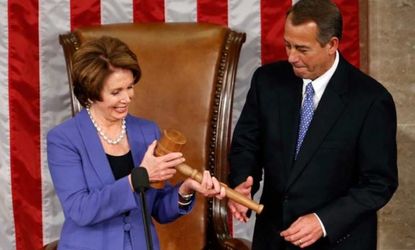Is gridlock inevitable in the 113th Congress?
The 112th Congress closed up shop to widespread jeers. Will its newly sworn in successor be any less ineffective?


Among the nicer things said lately about the extraordinarily ineffective, widely insulted 112th Congress: At least it was more popular than gonorrhea and North Korea. And now, with the 113th Congress having been sworn in Thursday, some analysts are speculating hopefully that, with 20 percent of Congress' members fresh-faced newcomers, the House and Senate just gaveled into session could not possibly be worse than their predecessors. Others, however, argue that the new Congress will remain plagued by the same deep divisions that stymied the 112th. The Senate will still be controlled by Democrats, whose majority was strengthened in the November elections, while the House is run by a Republican Party more determined than ever to insist on severe spending cuts after being forced to swallow tax hikes on the wealthy as part of the last-minute deal to avoid the worst effects of the fiscal cliff. With major fights looming over raising the debt ceiling and dealing with postponed fiscal-cliff spending cuts, will the new Congress be stuck in the same, old gridlock?
The 113th is doomed to the same crippling division: "There is no honeymoon ahead," say Sean Sullivan and Aaron Blake at The Washington Post. Republicans forced to cave on taxes will be out for payback in the coming debt-ceiling debate. Judging by John Boehner's narrow re-election as House speaker, plenty of Republicans remain "willing to adopt a stern posture and make a statement." And "more spats over cabinet confirmations will only fuel partisan divisions."
"5 reasons gridlock will seize Congress again"
Subscribe to The Week
Escape your echo chamber. Get the facts behind the news, plus analysis from multiple perspectives.

Sign up for The Week's Free Newsletters
From our morning news briefing to a weekly Good News Newsletter, get the best of The Week delivered directly to your inbox.
From our morning news briefing to a weekly Good News Newsletter, get the best of The Week delivered directly to your inbox.
But lawmakers know voters won't tolerate more gridlock: The rancor that hobbled the 112th Congress is still rampant on Capitol Hill, economist Alice Rivlin tells The Jacksonville (Fla.) Times-Union. Still, "I am encouraged by the show of bipartisan cooperation" that it took to avert the fiscal cliff. Angry voters and business leaders have finally made politicians see that America wants lawmakers to work together to get things done.
"Angry voters will end all this gridlock, economist says"
This Congress will get a little more accomplished than the last one: There has been no sea change, say Halimah Abdullah and Ben Brumfield at CNN, so anyone expecting this Congress to "dissolve partisan gridlock" is dreaming. Still, "the incoming freshman class took notes on failures of the previous Congress in hopes of avoiding a repeat performance." It might manage to muster enough cooperation "to exceed the abysmal approval rating of the previous Congress."
Sign up for Today's Best Articles in your inbox
A free daily email with the biggest news stories of the day – and the best features from TheWeek.com
Create an account with the same email registered to your subscription to unlock access.
Harold Maass is a contributing editor at The Week. He has been writing for The Week since the 2001 debut of the U.S. print edition and served as editor of TheWeek.com when it launched in 2008. Harold started his career as a newspaper reporter in South Florida and Haiti. He has previously worked for a variety of news outlets, including The Miami Herald, ABC News and Fox News, and for several years wrote a daily roundup of financial news for The Week and Yahoo Finance.
-
 'Voters know Biden and Trump all too well'
'Voters know Biden and Trump all too well'Instant Opinion Opinion, comment and editorials of the day
By Harold Maass, The Week US Published
-
 Is the Gaza war tearing US university campuses apart?
Is the Gaza war tearing US university campuses apart?Today's Big Question Protests at Columbia University, other institutions, pit free speech against student safety
By Joel Mathis, The Week US Published
-
 DOJ settles with Nassar victims for $138M
DOJ settles with Nassar victims for $138MSpeed Read The settlement includes 139 sexual abuse victims of the former USA Gymnastics doctor
By Justin Klawans, The Week US Published